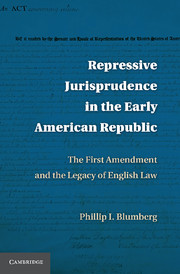 Repressive Jurisprudence in the Early American Republic
Repressive Jurisprudence in the Early American Republic Book contents
- Frontmatter
- Contents
- Acknowledgments
- 1 Political and Jurisprudential Worlds in Conflict in the New Republic
- 2 Politics in the New Republic
- 3 Criminal Libel in the Colonies, the States, and the Early Republic During the Washington Administration
- 4 Federalist Partisan Use of Criminal and Seditious Libel – Statutory and Common Law – During the Tumultuous Adams Administration
- 5 Criminal Libel During the Jefferson and Madison Administrations, 1800–1816
- 6 Partisan Prosecutions for Criminal Libel in the State Courts: Federalists Against Republicans, Republicans Against Federalists, and Republicans Against Dissident Republicans in Struggles for Party Control
- 7 Established Jurisprudential Doctrines (Other than Criminal Libel) Available in the New Republic for Suppression of Anti-Establishment Speech
- 8 Still Other 19th-Century Doctrines for Suppression of Anti-Establishment Speech: The Law of Blasphemy and the Slave State Anti-Abolition Statutes
- 9 Conclusion
- Table of Cases
- Index
3 - Criminal Libel in the Colonies, the States, and the Early Republic During the Washington Administration
Published online by Cambridge University Press: 05 October 2010
- Frontmatter
- Contents
- Acknowledgments
- 1 Political and Jurisprudential Worlds in Conflict in the New Republic
- 2 Politics in the New Republic
- 3 Criminal Libel in the Colonies, the States, and the Early Republic During the Washington Administration
- 4 Federalist Partisan Use of Criminal and Seditious Libel – Statutory and Common Law – During the Tumultuous Adams Administration
- 5 Criminal Libel During the Jefferson and Madison Administrations, 1800–1816
- 6 Partisan Prosecutions for Criminal Libel in the State Courts: Federalists Against Republicans, Republicans Against Federalists, and Republicans Against Dissident Republicans in Struggles for Party Control
- 7 Established Jurisprudential Doctrines (Other than Criminal Libel) Available in the New Republic for Suppression of Anti-Establishment Speech
- 8 Still Other 19th-Century Doctrines for Suppression of Anti-Establishment Speech: The Law of Blasphemy and the Slave State Anti-Abolition Statutes
- 9 Conclusion
- Table of Cases
- Index
Summary
Introduction
An examination of the laws of criminal libel including seditious libel in the early days of the Republic starts with the very roots of American jurisprudence. These are found in the criminal libel doctrines of the English law that governed the American Colonies of Great Britain in the period before the Declaration of Independence in 1776 and their incorporation into the new legal systems of the newly sovereign states. Thereafter, they played a major role in the new jurisprudence of the United States at the close of the 18th century. This chapter reviews this aspect of the new jurisprudence of the Early Republic in the period from the adoption of the Constitution to the outbreak in late 1797 of the undeclared naval war with France and the ensuing enactment of the Sedition Act of July 14, 1798.
At the outset, it is necessary to unbundle the various strands of 18th-century libel law. Libel law was divided into actions for civil libel and prosecutions for criminal libel. Civil actions, with which we are not concerned, include controversies between private parties in which one private party seeks damages from another for allegedly false statements leading to disrepute, contempt, or ridicule. In civil libel, evidence of the truth of the challenged allegations was admissible. Except for the judicial branch that provides a forum for the trial of the case, the government was in no way involved.
- Type
- Chapter
- Information
- Repressive Jurisprudence in the Early American RepublicThe First Amendment and the Legacy of English Law, pp. 52 - 71Publisher: Cambridge University PressPrint publication year: 2010
- 1
- Cited by


